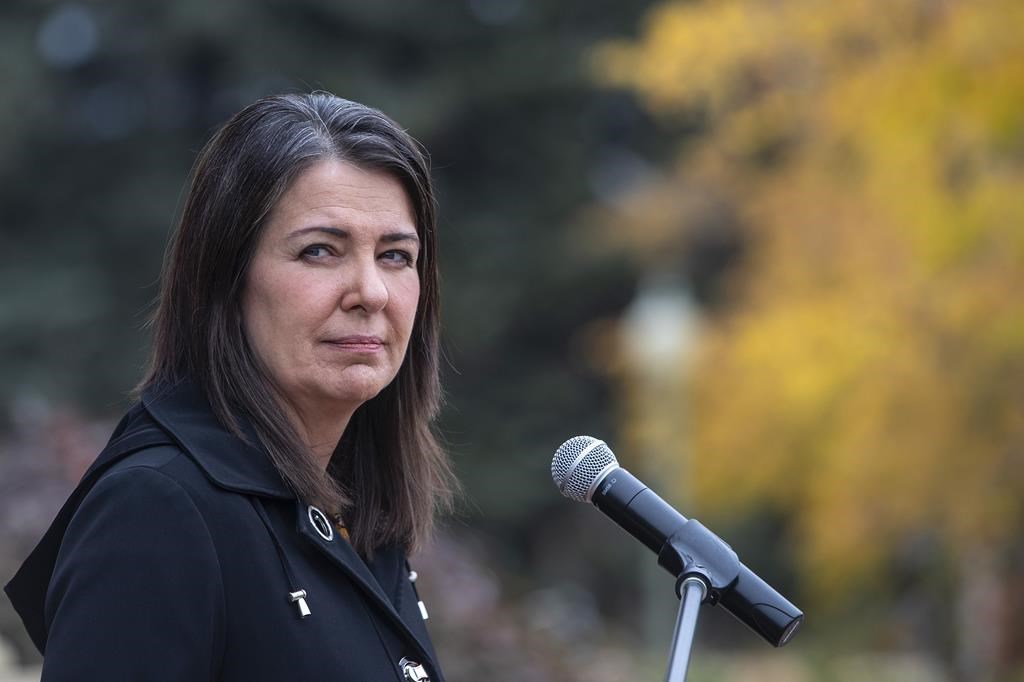‘Very worrisome’: Reaction to Alberta’s sovereignty act bill pours in

Posted November 30, 2022 11:56 am.
Last Updated November 30, 2022 12:33 pm.
“Undemocratic,” “worrisome,” and “a risk” — that’s how some people are describing the proposed Alberta sovereignty act.
The details of the act, the full title of which is the Alberta Sovereignty Within a United Canada Act, are highly controversial.
Duane Bratt, political scientist at Mount Royal University, says the proposed legislation is “clearly about violating federal law.”
“I didn’t anticipate the anti-democratic aspect within Alberta,” Bratt said. “The ability of bypassing the legislative assembly, the ability of directing provincial entities — and they have chosen as broad a definition of provincial entities as you can imagine. I think this is very worrisome.”
Prime Minister Justin Trudeau says he will be taking a closer look at Alberta’s Bill 1, adding some in the province are already “expressing real concern about the fact that the Alberta government is choosing the bypass the legislature.”
“I’m not going to take anything off the table,” he said, adding “I’m also not looking for a fight.”
“We want to continue to be there to deliver for Albertans,” Trudeau continued.
“I don’t think that this is appropriate for a province to determine whether or not a federal law exceeds it’s constitutionality. That is for a court.”
One of the reasons that Kenney lost the UCP leadership was his relationship with caucus. Smith just introduced a bill that would take more power from caucus than Kenney ever dreamed of doing.
— Duane Bratt (@DuaneBratt) November 30, 2022
Bratt says he thinks Alberta Premier Danielle Smith is “daring” the federal government to step in and invoke disallowance.
He adds disallowance, which is part of Canada’s constitution, gives the federal government the power to block any provincial legislation, though it hasn’t been used in decades.
“As bad as the situation is right now, if Trudeau was to do that, that would make a bad situation so much worse,” Bratt explained. “But it’s clear that Smith wants to fight Trudeau so that we forget about what she is doing to democracy in Alberta. Let’s be clear, all they have done is introduce the bill, there’s a whole series of steps that it has to go through — does it get amended? I’m not sure how carefully briefed caucus or cabinet were on this. It appeared from the press conference that even (Tyler) Shandro and Smith were uncertain of some of the items that were contained in the legislation.”
RELATED VIDEO: Ethical concerns around Alberta’s premier calling publicly funded events with vaccine mandates
He says the bill appears to include sweeping powers for the premier and her government to rewrite any and all federal laws as they see fit.
“We refer to these as ‘Henry VIII powers,’ because it allowed King Henry VIII to bypass the British parliament,” Bratt said.
“There’s been comparisons to the Emergencies Act … It’s not even close. The Emergencies Act was about a clearly defined crisis, that doesn’t exist in this case. It was time-sensitive, it lasted for 10 days. A particular law could last for two years with the possibility of renewing it for another two years — that’s not time sensitive.”
It remains to be seen what the full implications, if any, the introduction of this bill will have, Bratt adds.
Smith promised the legislation when she was a candidate in the United Conservative Party leadership race to replace now-former Premier Jason Kenney, who resigned as an MLA the same day the bill was introduced. She characterized the bill as a way to push back against Ottawa.
“This is being framed as protecting Alberta to fight Ottawa, but this is actually the erosion of democracy in Alberta,” Bratt said.
More seriously, the Smith govt is committing itself to eroding democracy/rule of law in Alberta in order to combat its perception of federal govt jurisdiction overreach. In other words, punishing Albertans to thwart Trudeau.
— Duane Bratt (@DuaneBratt) November 30, 2022
Alberta sovereignty act bill raises business concerns
Deborah Yedlin, president and CEO of the Calgary Chamber of Commerce, says she’s disappointed with the province’s “aggressive” approach.
“Of course we look at it through the lens of business. We know that Alberta competes with the world for capital and for talent,” Yedlin said. “When there are other places that provide more certainty that will not result in companies potentially having to put plans on hold due to legal processes that could be undertaken — capital goes to where it gets the best return — so it will be allocated somewhere else.”
Yedlin says the proposed legislation is going to “cast a shadow over Alberta” and will give pause to people considering a career in the province.
She adds businesses are facing big issues such as affordability, inflation, talent retention and recruitment, and supply chain challenges. While she says she doesn’t expect businesses to be pulling out of Alberta anytime soon, this isn’t where they want the focus of the government to be.
“The spectre of uncertainty introduced in Quebec caused Montreal — which was the biggest city in Canada before the separatists came to power — businesses left. They either left the province or they scaled down their presence in the province significantly. Let’s think about what that impact was, and how long it’s taken for Montreal to gain its footing as an economic centre, and we definitely don’t want that to happen either in Alberta or in Calgary,” Yedlin said.
“Remember, we have worked so hard. We have had seven tough years — with the energy crash and then with COVID. We have worked hard to reestablish economic growth, get a real strong foothold on diversification. We can’t risk this right now, and we see this as a risk to our economic prosperity.”
‘Proposed Act is self-centred, short-sighted’: Treaty Six Chiefs
The Chiefs of Treaties 6, 7, and 8 First Nations have all spoken against the act.
Chiefs from the Confederacy of Treaty 6 Nations said in a statement that they remain unanimous in opposition to the act.
“We are taking time to review and consider the details and implications of the proposed Act. It has been promoted as a formula for allowing the province of Alberta the option to disregard rules it doesn’t like or deems anti-Albertan,” the statement read.
“As Indigenous Peoples, we understand individual freedom as something that can only exist in the context of good relations with others, including our ancestors and the generations to come. We believe the proposed Act is self-centred, short-sighted and in opposition to these principles.”
The Chiefs say the lack of consultation with Indigenous Peoples suggests that Reconciliation is “not a priority” for Smith and the UCP government.
“We also must take this opportunity to remind the premier of the Relationship Agreement between the Confederacy of Treaty Six First Nations and the Government of Alberta signed in July of 2022, which ‘formalizes a government-to-government relationship based on collaboration, commitment and cooperation.’ We hope those qualities characterize our relationship going forward.”
RELATED VIDEO: Treaty Chiefs oppose provincial sovereignty act
Treaty 8 First Nations Grand Chief Arthur Noskey previously criticized the act.
“Smith’s proposed bill undermines the authority and duty of the Sovereign Nations that entered into treaty,” Noskey said. “How can the province make a sovereignty bill when our treaties were made before the creation of Alberta?”
Opposition NDP deputy leader Sarah Hoffman weighed in Tuesday, saying in a statement that the bill is a flagrant undemocratic power grab by a premier who has not sought a popular mandate to propose such sweeping changes.
“Danielle Smith was elected by one per cent of the Alberta voters, and now she wants to give herself dictatorial powers,” Hoffman said. “Danielle Smith and the UCP are focused on creating more chaos, costs and conflict with her Sovereignty Act.”
How would the sovereignty act work?
A statement from the Alberta government says the act would not unilaterally allow cabinet to amend laws and bypass the legislative assembly.
“If there is any dispute as to whether or not cabinet amended legislation outside of the specific recommendations contained in the resolution, including any amendments by the legislative assembly to the resolution, such actions would still be subject to both judicial review as well as review by the legislative assembly itself,” the statement reads.
“The rationale for this process is simply to allow the legislative assembly a tool to act swiftly and efficiently in protecting Albertans from federal initiatives that violate the constitutional or charter rights of Albertans or which otherwise harm the interests of Albertans.”
Meanwhile, the Ministry of Justice released an explanation of how the act would work.
“The [cabinet] authorities under Section 4 only become applicable once the conditions in Section 3 have been met [passage of a resolution by the legislative assembly]. Under Section 3, on the motion of a minister, a resolution will be debated in the legislature and, if passed, will make recommendations to cabinet on the actions that should be taken in response to the unconstitutional actions of the federal government or to address the harm inflicted on Albertans. If that happens, then the authorities under Section 4 can be used, but only to the extent they are necessary or advisable to carry out the measures recommended in the motion,” the statement reads.
“It is important to note that the resolution will specify the recommended actions. It is the recommendations and the content of the resolution as passed that will determine the extent to which cabinet will be able to exercise its authorities under Section 4 to amend legislation or pass other orders in council. While Section 4 provides the necessary authority for cabinet to amend legislation once a resolution is passed, that authority can only be exercised if the scope of the recommendations of the resolution makes such actions necessary or advisable. The authority is further limited as its exercise has to relate to addressing the harm or unconstitutionality at the heart of the resolution in question.”
–With files from Logan Stein, Alejandro Melgar, and The Canadian Press








